Any rock bio worth the trees it felled rests on three unshakeable pillars: 1) an interesting subject; 2) comprehensive research; and 3) compelling storytelling. A book can be powered by oceanic amounts of analysis, but if the prose is dry and lifeless, it is not worth the plastic bag that carries it home. Likewise, a fast-moving story full of innuendo and hearsay is maddeningly unsatisfying. The best ones expertly weave all three, avoiding overt partisanship while selecting stories that deliver both insight into the artist and tension into the story.
Beginning with Keith Richards' encyclopedic best-seller, running through Duff McKagan's pancreatic nightmare, 2011 saw an army of musicians, insiders and rock journalists scramble to capitalize on the public's insatiable craving for rock biographies. Some of the better offerings sidestepped the archetypal rock bio format, such as Slipknot frontman Corey Taylor's best selling meditation on the seven deadly sins. Ice-T's biography (admittedly not a full-fledged rock star) included an appendix of the rapper's most colorful motivational quotes ("Don't just watch how your friends treat you. Notice how they treat others. If they treat others fucked up, it just might not be your turn yet").
2012 promises to be another banner year for rock reads, with a landslide of titles covering everyone from Buddy Guy to Radiohead. For now, here are ten of the best rock biographies that your hard-earned money can buy.
!['Dirty Deeds']() 10. "Dirty Deeds: My Life Inside/Outside AC/DC" by Mark Evans
10. "Dirty Deeds: My Life Inside/Outside AC/DC" by Mark Evans
The Subject: Mark Evans, AC/DC bassist from 1975 through 1977. Though he played in AC/DC for just three of their thirty-nine years, he is the first member to break the band's omerta and discuss life in one of the most successful bands in rock history.
The Story: Dirty Deeds easily earns its spot on this list with an eye-popping view into the inner workings of AC/DC and the clannish, cutthroat and often-violent attitudes of founding brothers Malcolm and Angus Young. Massive personalities, unbelievable stories and more back-stabbing and fisticuffs than a gangster flick move the story along briskly. Evans' insights concerning Bon Scott, a man whose legend has deeply obscured his actual persona, reveal a moody, sometimes depressive man who could not wait to get away from the Youngs as soon as the gigs were over.
Refreshingly, this is no hatchet job. Although Evans was dismissed from the band for the flimsiest of excuses, he is quick to point out the many talents of his former band mates. Good-natured, self-deprecating and one heck of a storyteller, Evans' account carries on well beyond his Acca Dacca period, and no reader could possibly steel themselves for the sucker-punch that brings the story to a close. Evans' humor and Down Under colloquialisms create a loose, conversational vibe that reveal Evans to be infinitely more likeable and interesting than any of his former bandmates.
Get Dirty Deeds at Bookshop or Amazon
!['Catch A Fire: The Life of Bob Marley']() 9. "Catch a Fire: The Legend of Bob Marley" by Timothy White
9. "Catch a Fire: The Legend of Bob Marley" by Timothy White
The Subject: Reggae legend Bob Marley, whose premature death in 1981 silenced one of the twentieth century's most influential and enigmatic personalities.
The Story: Although Western culture tends to view Bob Marley as a kindly, dope-smoking prophet of peace, he was in fact a polarizing icon in a bitterly violent culture who was nearly taken out by an assassin's bullet as he approached the height of his career. Marley's obsession with Rastafarianism and its many cultural and political implications underpinned his groundbreaking body of music and informed a revolutionary world view. In addition to attracting the attention of political rivals and assassins, Marley's activities additionally earned him the interest of the CIA. Yet through these challenges, Marley wrote and recorded some of the most inspirational music of the twentieth century. The Wailers' Burnin' and Exodus albums continue to consistently claim spots in the world's lists of essential albums and there are few dorm rooms in America missing a copy of Marley's Legend.
Catch a Fire begins with a historical overview of Rastafarianism that place Marley's lyrics in a vital new context. White vividly recounts the rise and fall of The Wailers--The Beatles of the reggae world--and examines Marley's legend decades after his death, including the musical careers of Marley's children and the legal wrangling over the artist's considerable estate. The larger challenge was separating the man from the myth, but in order to address that task, White was first compelled to crack the culture of the insular Jamaican ghetto communities where much of the story takes place. His successes on both fronts breathe new life into Marley's music, which the reader will most certainly revisit well before the final page is turned.
Get Catch A Fire at Bookshop or Amazon
!['Lords of Chaos']() 8. "Lords of Chaos: The Bloody Rise of the Satanic Metal Underground" by Michael Moynihan and Didrik Soderlind
8. "Lords of Chaos: The Bloody Rise of the Satanic Metal Underground" by Michael Moynihan and Didrik Soderlind
The Subject: The musicians of Norway's second wave of black metal--a brutal style of heavy metal associated with lo-fi production and Satanic themes--became Europe's deadliest criminals in the early Nineties, spending their time off-stage burning down historic churches, murdering innocent people and eventually killing each other.
The Story: Norway's black metal community in the early-Nineties made the thugs of Death Row records look like the daintiest of Girl Scouts. While pioneering a dark new style of heavy metal, the musicians kicked off one of the most depraved and violent crime sprees in Europe, their offenses including suicide, cannibalism, assault, murder and terrorism. As the bodies pile up and the churches burn down, the story of this fringe group of metallers hijacks Europe's headlines, culminating in the trial of musician Varg Vikernes, who burned down several churches before murdering his bandmate in what he claimed to be self-defense (sixteen stab wounds in the victim's back, along with five in the neck and two in the head suggest another possibility).
Hollywood could not have conceived a more unbelievable story: a group of disgruntled musicians living on society's fringe make up a new set of rules and systematically begin destroying the people and institutions who clash with these rules. The villains are real and their testimony is chilling. Hellaciously well-written, putting this book down is a tall order once you've started.
Get Lords of Chaos at Bookshop or Amazon
!['Drinking With Strangers']() 7. "Drinking With Strangers: Music Lessons from a Teenage Bullet Belt" by Butch Walker and Matt Diehl
7. "Drinking With Strangers: Music Lessons from a Teenage Bullet Belt" by Butch Walker and Matt Diehl
The Subject: Musician, songwriter and producer Butch Walker. Although Walker is an established performer in his own right, his talents producing hit records for pop queens have made him one of music's most important insiders.
The Story: Drinking With Strangers is part-rock biography and part-industry commentary, although the reason it succeeds is because it is simply a great story. Walker graduated from high school and headed to Los Angeles to become a poufy-haired rock god during the glam metal explosion of the Eighties. He realized more success than most, although his dreams of becoming the next Nikki Sixx were put to rest after a disastrous tour of China.
Walker goes on to become one of the music industry's most influential producers, shining up commercially-titanic records for Katy Perry, Pink and Avril Lavigne. The stories behind these hits and Walker's candid assessments of the music industry are fascinating, exposing some of the industry's unsavory realities in humorous, accessible terms. His story about trying to produce a record for Lindsay Lohan is both depressing and howling-out-loud funny.
Drinking With Strangers is required reading for anyone trying to make it as a professional musician, but any music fan will enjoy Walker's insight into how bands go from being unknowns to superstars. He candidly discusses the technologies used to turn talentless hacks into multi platinum divas and his own personal experiences as a musician are both tragic and entertaining. Graphs and drawings are scattered through the book for additional humor, such as his list on how to make a successful music video.
Get Drinking With Strangers at Amazon
!['Scar Tissue']() 6. "Scar Tissue" by Anthony Kiedis and Larry Sloman
6. "Scar Tissue" by Anthony Kiedis and Larry Sloman
The Subject: Anthony Kiedis, vocalist for Red Hot Chili Peppers, entered show business as a promising child actor before drugs and all their seditious trappings caught up with him and began to systematically destroy him. Behind the single sock photo shoots and whacked-out videos is an intensely complex, talented and likable guy who barely made it out alive.
The Story: Anthony Kiedis hits the ground running, smoking and snorting his way through the clubs of Los Angeles before he's old enough to drive. His earliest role models were his drug dealing dad and his godfather Sonny Bono, giving the young libertine a false sense of maturity as he entered his formative years. En route to becoming one of rock and roll's most famous frontmen, Kiedis ends up an intravenous drug-shooting junkie, haunting the bridges of Los Angeles in search for whatever dope his track-marked arm can hold. Though surrounded by friends, money and seemingly endless resources, not even the fatal overdose of band member Hillel Slovak can scare him off of the junk and the pages fly at a frenzied clip as he spirals deeper and deeper into addiction.
Of all the books in the list, this is the feel-good read of the bunch. Scar Tissue reveals Kiedis to be a man of substance and resilience. His discussion of his recovery from addiction in the final chapter is a deeply satisfying, hopeful summation of a fantastic journey.
Get Scar Tissue at Bookshop or Amazon
!['No One Here Gets Out Alive']() 5. "No One Here Gets Out Alive" by Jerry Hopkins and Danny Sugerman
5. "No One Here Gets Out Alive" by Jerry Hopkins and Danny Sugerman
The Subject: Jim Morrison (AKA "Mr. Mojo Risin"), former vocalist for The Doors, published author and the Lizard King.
The Story: This masterpiece of music journalism chronicles Morrison's rise from military brat to a bloated heroin addict, slinking through the streets of Paris in his final days, finally dying in a bathtub at age 27. Between these points is a far-flung odyssey that rivals the Greek myths that Morrison enjoyed so much.
While the swollen teat of electric blues was being milked dry by the British Invaders and as America's FM culture went flaccid from the onslaught of folkie songwriters, The Doors pioneered a brawling strain of rock and roll that was rooted in jazz and flamenco as much as in the soul of Muddy Waters. Morrison was an insurgent intellectual who morphed from a chubby bookworm to panther-like rock god in a few short years. He picked up a nifty drinking habit, got turned on to heroin and became insufferable in the way that only criminally-talented rock stars can become. Morrison's arrest in Miami for indecent exposure signaled the beginning of the end of his rock and roll career, but by then he was more than ready to abandon music in favor of a life as a poet. Unfortunately, his life abruptly ended before the next chapter began.
Critics allege that Hopkins and Sugerman write as fans more than journalists and there is some weight to this accusation. Nonetheless, Morrison was larger-than-life, even beyond the authors' puffery, and although his death has finally been explained, his myth as the Lizard King continues to grow. The stories within these pages illustrate precisely why.
Get No One Here Gets Out Alive at Bookshop or Amazon
!['The Dirt']() 4. "The Dirt" by Nikki Sixx, Vince Neil, Mick Mars, Tommy Lee and Neil Strauss
4. "The Dirt" by Nikki Sixx, Vince Neil, Mick Mars, Tommy Lee and Neil Strauss
The Subject: Hair metal bad boys Motley Crue look back on their decades of wanton hedonism and unbridled commercial success, pausing occasionally to stab each other in the back.
The Story: A group of hoodlums from Los Angeles distil the heaviness of metal with the camp of glam rock and help to pioneer the hair band movement of the Eighties. While many biographies are happy to mine the ravaged veins of sex, drugs and rock and roll, the story of the Crue goes one louder, with stories of orgies, overdoses and relentless multi-platinum dominance. (My review HERE.)
These guys dish on each other like a gaggle of catty schoolgirls, airing each other's dirty laundry and critically annihilating the talents and shortcomings of each other with wit and sarcasm. Motley Crue could never have realized such commercial success and cultural saturation without talent and single mindedness, but the amount of violence the band commits against each other and strangers is thoroughly shocking. While notions of redemption are premature, some lessons are learned (never the easy way) while others are deftly avoided, and well into middle age, old habits persist. Good luck combing the library for a more entertaining and compelling group of antiheroes.
Author Neil Strauss sets the book up as a series of loosely-connected interviews, and by letting the principals offer sometimes competing views of singular incidents, we don't just see the real story, but we look into the delusional minds of the men who lived it.
Get The Dirt at Bookshop or Amazon
!['Life']() 3. "Life" by Keith Richards and James Fox
3. "Life" by Keith Richards and James Fox
The Subject: Keith Richards, co-founder and guitarist of The Rolling Stones and friend of drug dealers worldwide.
The Story: Richards' autobiographical opus begins with his birth and ends in 2010, missing very little ground in between. He might have omitted a lunch or two, but that's about it. Richards acknowledges that many of these episodes relied on input from others, and thankfully he has assembled the perfect cast to help him tell one of music's greatest stories.
While the eye-watering volume of stories of his youth in post-WWII Dartford challenge the reader's dedication, the story finally takes off with the formation of the Rolling Stones, their early successes and the supporting characters who bring tension, humor and often sadness to the story. The Stones swapped girlfriends, partied like Romans and wrote the anthems of a generation, but it is the tangential stories that invest Life with depth and weight, such as Richards' complicated relationship with Anita Pallenberg and his abiding affection for former keyboardist Ian Stewart--the only musician who ever had a standing invitation to join the Stones onstage.
With a public image that has weathered every manner of scandal imaginable, Richards has little incentive to gloss over his misdeeds, and he gleefully dishes on the inner workings of the Rolling Stones from their years as an R&B cover band to the greatest rock band in the world. Poor Mick Jagger endures more than his fair share of abuse, with Richards painting himself as the kindly, music-loving ne'er-do-well and Jagger as a vain, calculating phony. Richards' discussion of his periods as a drug addict feel thin, with Richards playing it off more like a cold to be endured rather than a terrifying and unstoppable compulsion, but his takes on Stewart, founding member Brian Jones and friend and drug buddy Gram Parsons reveal a sincerity and heart that transcend Richards' image as a rough-and-tumble party guy.
Get Life at Bookshop or Amazon
!['Enter Night']() 2. "Enter Night: A Biography of Metallica" by Mick Wall
2. "Enter Night: A Biography of Metallica" by Mick Wall
The Subject: The story of the world's biggest heavy metal act is finally and authoritatively delivered by none other than the grand-daddy of music journalism himself, Mr. Mick Wall.
The Story: Before crafting their trademark sound, Metallica first endured rounds of lineup changes, including the enlistment and ignominious dismissal of the mercurial Dave Mustaine, who later formed revenge group Megadeth. In their ruthless quest to amass the perfect roster, the aggressive, uber-masculine, hard-drinking rockers recruit San Francisco bassist Cliff Burton and at his insistence, they relocate to his hometown. With zero support from commercial radio, Metallica go on to release the greatest heavy metal album of all time, Master of Puppets, only to watch their vision implode when Burton, the soul and conscience of the band, is is the only one killed when the band's tour bus crashes in Sweden.
The ensuing years see the band hire and then torment bassist Jason Newsted, eventually crossing over into the mainstream with their bazillion-selling Black album. In-fighting and some embarrassing public relations gaffes nearly destroy the band, and Wall's account explores these stories in terrific detail, neither sensationalizing the figures nor holding back a critical view of events. Drummer Lars Ulrich and guitarist/songwriter James Hetfield call most of the shots and their need to control all aspects of the band, plus the bedevilments of testosterone and ego, invest even the smallest of incidents with tension and sometimes violence. That Metallica succeeded in spite of death and their own short-sighted impulses make this an epic and unbelievable journey.
Wall's commentary, like a Greek chorus, places the people and events in a new light. Fans decry the Black album as a monument to selling out, yet Wall asserts that it was a shrewd move by a band refusing to be painted into a corner, rehashing the exact same sound from album to album. He also drops the bomb that drummer and founder Lars Ulrich was literally days away from being fired, his dismissal interrupted by the death of Burton, who had been promoting the personnel change from within.
Get Enter Night at Bookshop or Amazon
!['Hammer of the Gods']() 1. "Hammer of the Gods" by Stephen Davis
1. "Hammer of the Gods" by Stephen Davis
The Subject: Led Zeppelin and the two men who went to any lengths required to protect the band's image and fortunes.
The Story: Led Zeppelin are singularly responsible for an incalculable percentage of modern music. Sure, they brazenly ripped-off an army of blues and folk players, but they pounded those old sounds into a muscular new form of rock and roll that sounds as fresh and potent today as it did when they first began playing. The Zeppelin story is more than just the tale of four guys who pioneered hard rock--it is the story of the rise of rock and roll and all the excess and cliches that have come to define its culture. Led Zeppelin were making history with every album and they knew it.
Manager Peter Grant and road manager Richard Cole emerge as two of the more interesting figures in the Zeppelin story. Grant was a physically intimidating bully who savagely beat anyone who tried to exploit the band and whose loathing for bootleggers was legendary. Cole, their confederate and protector on the road, orchestrated unfathomable incidents of debauchery, then cleaning up the wreckage as the band set their sights on the next unsuspecting city. Zeppelin could never have become superstars without these two men protecting the band in the back offices of record labels and in the world's hotels and auditoriums.
From the famous story of the mudfish to the later tragedies that destroyed the band (the death of drummer John Bonham, the addiction of Jimmy Page and the death of Robert Plant's young son), Zeppelin's legacy moves from one incomprehensible tale to the next. Though accusations have plagued this book that it is too reliant on the bitter and biased testimony of Cole, in fact it is a spectacularly well-written, jaw-dropping, addictive account of one of the most influential groups to ever record music.
So what say you, LitReactors? Did we miss any? Discuss in the comments. Would love to hear some recommendations.

About the author
Joe Daly is the senior Music Editor for the Los Angeles-based The Nervous Breakdown, one of the nation's premier online journals. He also freelances for several international music publications and a number of music and literary sites. Joe has held a broad range of positions in the music business including guitarist, singer, manager and PR slug and he has covered a staggering variety of genres over the years, from the trippy Balearic Beat music of Spain to Norway's grisly black metal scene, and all things in-between. When he is not drafting wild-eyed manifestos, Joe enjoys life in San Diego's groovy North County, doing yoga, running, playing guitar and spending tireless hours in deep and meaningful conversations with his beloved dogs, Cabo and Lola.
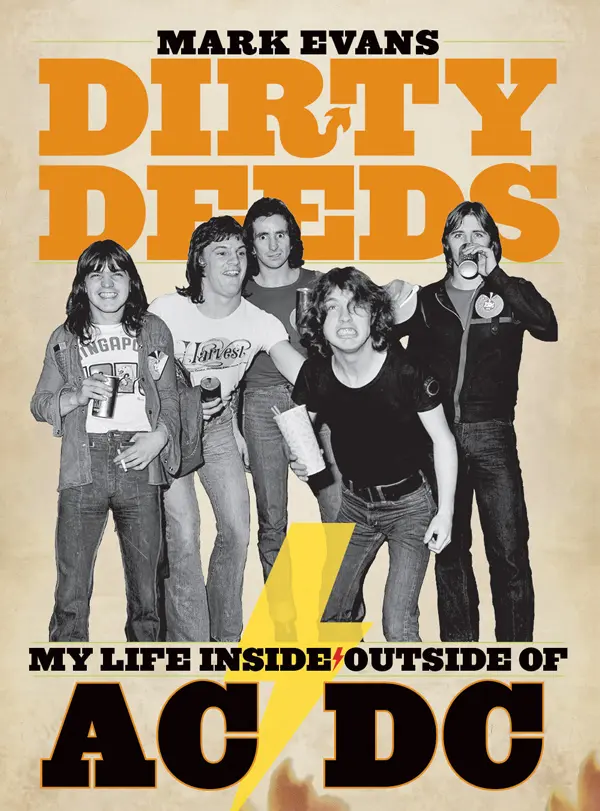 10. "Dirty Deeds: My Life Inside/Outside AC/DC" by Mark Evans
10. "Dirty Deeds: My Life Inside/Outside AC/DC" by Mark Evans
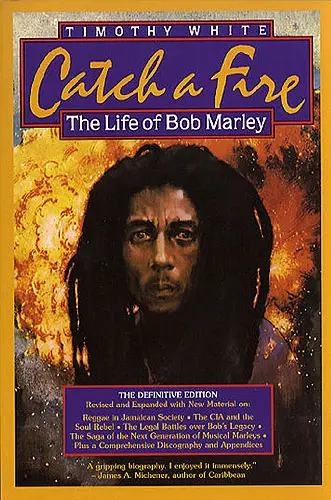 9. "Catch a Fire: The Legend of Bob Marley" by Timothy White
9. "Catch a Fire: The Legend of Bob Marley" by Timothy White
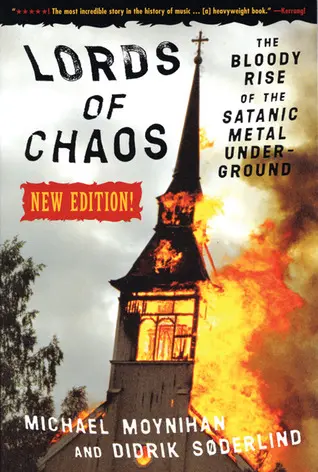 8. "Lords of Chaos: The Bloody Rise of the Satanic Metal Underground" by Michael Moynihan and Didrik Soderlind
8. "Lords of Chaos: The Bloody Rise of the Satanic Metal Underground" by Michael Moynihan and Didrik Soderlind
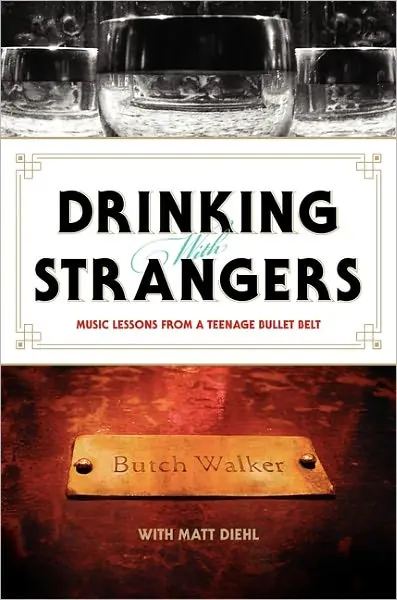 7. "Drinking With Strangers: Music Lessons from a Teenage Bullet Belt" by Butch Walker and Matt Diehl
7. "Drinking With Strangers: Music Lessons from a Teenage Bullet Belt" by Butch Walker and Matt Diehl
 6. "Scar Tissue" by Anthony Kiedis and Larry Sloman
6. "Scar Tissue" by Anthony Kiedis and Larry Sloman
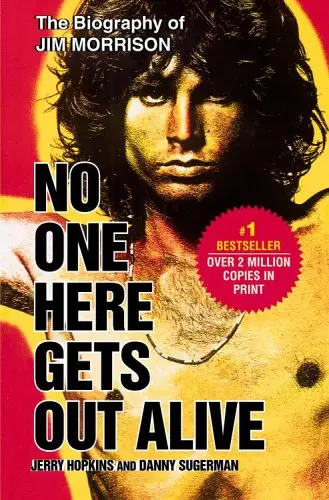 5. "No One Here Gets Out Alive" by Jerry Hopkins and Danny Sugerman
5. "No One Here Gets Out Alive" by Jerry Hopkins and Danny Sugerman
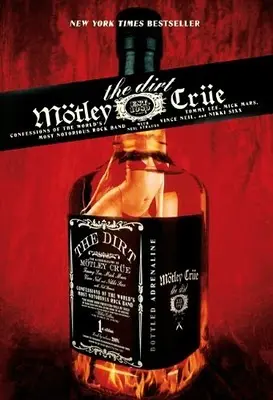 4. "The Dirt" by Nikki Sixx, Vince Neil, Mick Mars, Tommy Lee and Neil Strauss
4. "The Dirt" by Nikki Sixx, Vince Neil, Mick Mars, Tommy Lee and Neil Strauss
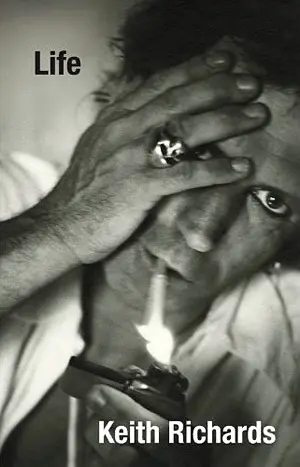 3. "Life" by Keith Richards and James Fox
3. "Life" by Keith Richards and James Fox
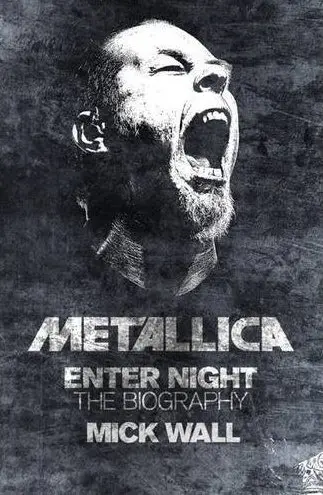 2. "Enter Night: A Biography of Metallica" by Mick Wall
2. "Enter Night: A Biography of Metallica" by Mick Wall
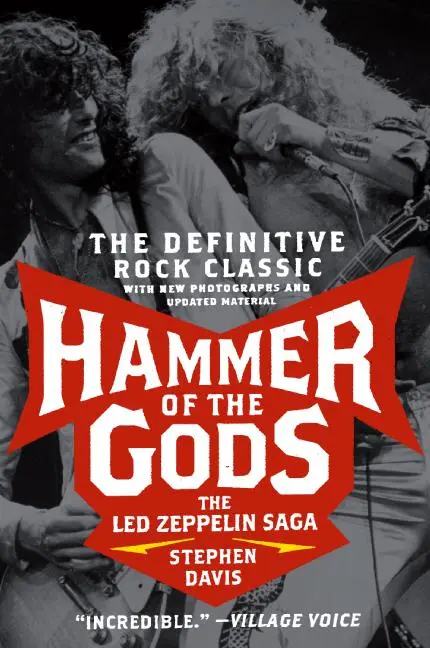 1. "Hammer of the Gods" by Stephen Davis
1. "Hammer of the Gods" by Stephen Davis








